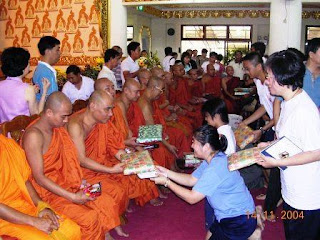What is the object of devotion?
With regard to the devotional aspect, the question arises, “what should one be devoted to?” or, “what is the object of faith and devotion?”
The Pali word saddha is translated as faith. In some context, it is rendered as confidence (pasada) or trust (pasanna). All these words signify faith.
So, by having faith what does one have faith in? to put it simply, one has faith in the Buddha, one has faith in the Dhamma, ie the teachings of the Buddha and one has faith in the Sangha, the disciples of the Buddha who follow and practice the teachings of the Buddha.
The basic principle of the Buddha’s teaching is the law of cause and effect. In other words, there’s nothing in the universe that is causeless. Every result arises due to pre-existing causes. For example, a seed cannot produce a tree without the suitable conditions of fertile soil, water and sunshine.
The Pali word saddha is translated as faith. In some context, it is rendered as confidence (pasada) or trust (pasanna). All these words signify faith.
So, by having faith what does one have faith in? to put it simply, one has faith in the Buddha, one has faith in the Dhamma, ie the teachings of the Buddha and one has faith in the Sangha, the disciples of the Buddha who follow and practice the teachings of the Buddha.
The basic principle of the Buddha’s teaching is the law of cause and effect. In other words, there’s nothing in the universe that is causeless. Every result arises due to pre-existing causes. For example, a seed cannot produce a tree without the suitable conditions of fertile soil, water and sunshine.
All the Buddha’s teachings are based on natural law of cause and effect. There’s no teaching whatsoever that is not based on this law. If one truly understands the Dhamma, one’s belief cannot be shaken by anyone or anything. It becomes unshakable because this natural law of cause and effect corresponds accurately with the nature. Since it corresponds so accurately with the nature, no one can dispute that it is untrue.
A person who understands Dhamma in this way does not seek any other faith or religion as a refuge. This leads to faith in the Buddha’s teachings called the Dhamma.
All members of the Sangha from the Buddha’s time until today practice accordingly to the Buddha’s teachings. Consequently, some became either completely or partially liberated from defilements and sufferings. There are others who were unable to uproot the defilements and today, there are many members of the Sangha who are still in the process of fulfilling the trainings on morality, concentration and wisdom with an utmost effort to get rid the defilements.
All these members of Sangha practise within the framework of the teaching and discipline expounded by the Buddha. In this way, one also has faith in the Sangha who not only follow and practise the Dhamma as taught by the Buddha, themselves, but also propagate the Dhamma to others.
A person who understands Dhamma in this way does not seek any other faith or religion as a refuge. This leads to faith in the Buddha’s teachings called the Dhamma.
All members of the Sangha from the Buddha’s time until today practice accordingly to the Buddha’s teachings. Consequently, some became either completely or partially liberated from defilements and sufferings. There are others who were unable to uproot the defilements and today, there are many members of the Sangha who are still in the process of fulfilling the trainings on morality, concentration and wisdom with an utmost effort to get rid the defilements.
All these members of Sangha practise within the framework of the teaching and discipline expounded by the Buddha. In this way, one also has faith in the Sangha who not only follow and practise the Dhamma as taught by the Buddha, themselves, but also propagate the Dhamma to others.




Comments